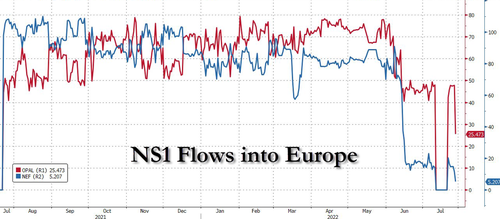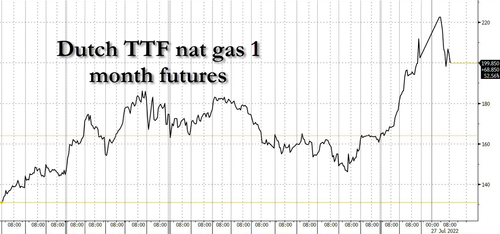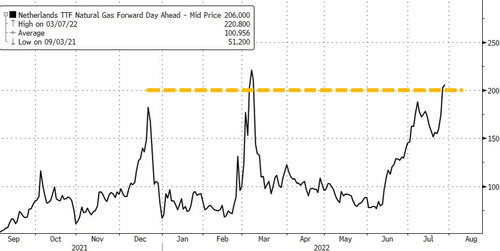
Less than 24 hours after EU countries approved the European executive's emergency natural gas consumption proposed cut of 15%, Russia further throttled gas supplies Wednesday, bringing deliveries through Nord Stream 1 to merely 20% of its total capacity, or roughly half of recent flows.
Reuters recorded that physical flows via Nord Stream 1 pipeline have fallen to 14.42mln KWH/H between 0900-1000BST (vs. 14.41mln KWH/H between 0800-0900BST; 27.77mln kWh/H between 05:00-06:00BST), noting further citing Germany’s gas network operator Gascade that since 07:00BST on Wednesday, 1.28MCM/hr - 20% of Nord Stream 1 maximum capacity has been transported in accordance with nominations. This sent prices soaring further to reach earlier all-time highs set immediately in the wake of the Ukraine invasion.
The Kremlin was cited as saying Wednesday that it is supply "as much gas to Europe as possible" but again stressed it's unable to guarantee supplies due to Western sanctions on vital equipment needed for proper maintenance and functioning.
Uniper and Italy's Eni have acknowledged receiving less gas from Gazprom through the start of this week into today, also with German Economy Minister Robert Habeck saying amid the scramble to stave off full-blown emergency rationing measures, "It is true that Germany, with its dependence on Russian gas, has made a strategic mistake but our government is working... to correct this."
Berlin accounts for 40% of all EU gas imports from Russia last year, and has been plunged into supply crisis since mid-June, when Gazprom initially halved its flows to the leading EU country (first cutting to 40% of capacity), with the federal government lately having to rescue its major gas importer Uniper with a $15 billion euro bailout.
Benchmark NatGas prices in Europe at the Dutch TTF hub:
...on track to reach new record closing high, after having already risen by more than a third on the week.
European gas prices Wednesday accelerated to reach earlier all-time highs just after Russia invaded Ukraine, rising 12% early in the day.

As FT also observes, "The European benchmark TTF contract has reached €220 a megawatt hour, leaving it on track to hit a new record closing high, exceeding the previous peak in the immediate wake of Russia’s invasion of Ukraine."
"The surge has left gas prices at roughly 10 times their level prior to the start of Russia’s squeeze on supplies last year. Gascade, Germany’s gas network operator, said flows on Nord Stream 1 had roughly halved to 20 per cent of capacity as of Wednesday morning," notes FT.
And from the Russian side, some of the latest out of Gazprom's executive leadership indicating the standoff over sanctioned foreign parts, crucial turbines in particular, looks to continue:
- GAZPROM'S DEPUTY CEO MARKELOV: CURRENTLY, ONLY ONE GAS PROCESSING UNIT IS WORKING AT PORTOVAYA COMPRESSOR STATION AT NORD STREAM 1 GAS PIPELINE
- MARKELOV: WE HAVEN'T RECEIVED THE ENGINE FROM SIEMENS
- MARKELOV: THERE ARE SANCTIONS RISKS FOR ENGINES
- MARKELOV: SIEMENS IS NOT WORKING TO SOLVE PROBLEMS
The head of Germany's network regulator Klaus Mueller has meanwhile been making urgent appeals for households and industry to save gas as the country is on the brink of having to trigger emergency rationing measures. "The crucial thing is to save gas," Mueller said. "I would like to hear less complaints but reports (from industries saying) we as a sector are contributing to this," he said in an interview with broadcaster Deutschlandfunk.
Less than 24 hours after EU countries approved the European executive’s emergency natural gas consumption proposed cut of 15%, Russia further throttled gas supplies Wednesday, bringing deliveries through Nord Stream 1 to merely 20% of its total capacity, or roughly half of recent flows.
Reuters recorded that physical flows via Nord Stream 1 pipeline have fallen to 14.42mln KWH/H between 0900-1000BST (vs. 14.41mln KWH/H between 0800-0900BST; 27.77mln kWh/H between 05:00-06:00BST), noting further citing Germany’s gas network operator Gascade that since 07:00BST on Wednesday, 1.28MCM/hr – 20% of Nord Stream 1 maximum capacity has been transported in accordance with nominations. This sent prices soaring further to reach earlier all-time highs set immediately in the wake of the Ukraine invasion.
The Kremlin was cited as saying Wednesday that it is supply “as much gas to Europe as possible” but again stressed it’s unable to guarantee supplies due to Western sanctions on vital equipment needed for proper maintenance and functioning.
Uniper and Italy’s Eni have acknowledged receiving less gas from Gazprom through the start of this week into today, also with German Economy Minister Robert Habeck saying amid the scramble to stave off full-blown emergency rationing measures, “It is true that Germany, with its dependence on Russian gas, has made a strategic mistake but our government is working… to correct this.”
Berlin accounts for 40% of all EU gas imports from Russia last year, and has been plunged into supply crisis since mid-June, when Gazprom initially halved its flows to the leading EU country (first cutting to 40% of capacity), with the federal government lately having to rescue its major gas importer Uniper with a $15 billion euro bailout.
Benchmark NatGas prices in Europe at the Dutch TTF hub:
…on track to reach new record closing high, after having already risen by more than a third on the week.
European gas prices Wednesday accelerated to reach earlier all-time highs just after Russia invaded Ukraine, rising 12% early in the day.
As FT also observes, “The European benchmark TTF contract has reached €220 a megawatt hour, leaving it on track to hit a new record closing high, exceeding the previous peak in the immediate wake of Russia’s invasion of Ukraine.”
“The surge has left gas prices at roughly 10 times their level prior to the start of Russia’s squeeze on supplies last year. Gascade, Germany’s gas network operator, said flows on Nord Stream 1 had roughly halved to 20 per cent of capacity as of Wednesday morning,” notes FT.
And from the Russian side, some of the latest out of Gazprom’s executive leadership indicating the standoff over sanctioned foreign parts, crucial turbines in particular, looks to continue:
- GAZPROM’S DEPUTY CEO MARKELOV: CURRENTLY, ONLY ONE GAS PROCESSING UNIT IS WORKING AT PORTOVAYA COMPRESSOR STATION AT NORD STREAM 1 GAS PIPELINE
- MARKELOV: WE HAVEN’T RECEIVED THE ENGINE FROM SIEMENS
- MARKELOV: THERE ARE SANCTIONS RISKS FOR ENGINES
- MARKELOV: SIEMENS IS NOT WORKING TO SOLVE PROBLEMS
The head of Germany’s network regulator Klaus Mueller has meanwhile been making urgent appeals for households and industry to save gas as the country is on the brink of having to trigger emergency rationing measures. “The crucial thing is to save gas,” Mueller said. “I would like to hear less complaints but reports (from industries saying) we as a sector are contributing to this,” he said in an interview with broadcaster Deutschlandfunk.








